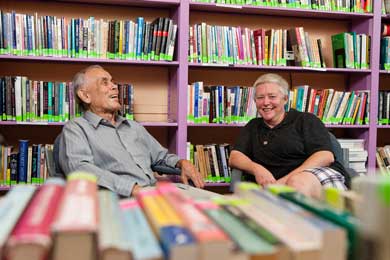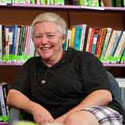
Jim Toy and Jackie Simpson, the first and current directors of the Spectrum Center. (Photo: Eric Bronson, U-M Photo Services.)
Much of the credit for that past progress—and for the current assistance now available to students with different sexual orientations—goes to Toy and his colleagues at the Spectrum Center, a resource and home for GLBTQ students housed in a small office in the Michigan Union. In November, the Spectrum Center celebrates its 40th anniversary with events ranging from panel discussions to musical performances.
The anniversary has also prompted the U-M community to take stock of how far it’s come down this path, and how far it and society have left to go. For people whose sexual orientation doesn’t fit the traditional mold, life is still often an exercise in courage and restraint.
Nothing else like it
When the University of Michigan opened its Human Sexuality Office (the predecessor to the Spectrum Center) in 1971, the American Psychiatric Association’s Diagnostic and Statistical Manual still listed homosexuality as a mental illness and every state in the nation had a sodomy statute. Needless to say, no one was making laws protecting gays and lesbians from discrimination based on their sexual orientation.
Given the social atmosphere, establishing an office to address the needs of gay and lesbian students was groundbreaking and risky. No other university in the country had anything like it. Some of the Center’s earliest work reflected the times. There were “raps” and teach-ins intended to educate the student body about homosexuality. A speakers bureau did outreach across campus. Today, the Spectrum Center’s work has expanded to include everything from counseling to a “Lavender Graduation” for LGBTQ seniors. It provides support groups for students who are questioning their sexuality, and for those who want advice in coming out. It offers “ally training” to people who want to support LGBTQ friends and family members. Victims of hate crimes can find help there, and among other resources there is a speakers bureau, HIV testing, and even an annual drag show.
Yet it hasn’t always been easy. Toy notes that he and co-director Cynthia Gair started working to have sexual orientation added to the university’s nondiscrimination policy in 1972—a change the Board of Regents approved 21 years later. Ten years after that, the policy was expanded again to include gender expression and gender identity.
Time and persistence have chipped away at the general public’s tolerance for intolerance, but discrimination doesn’t go away just because there’s a rule against it. “I think the effort around appreciation and inclusion of LGBT people still has a lot of work to do,” said Jackie Simpson, the current director of the Spectrum Center. “I think people feel to some extent that it’s still OK to be publicly homophobic.”That notion was tested last spring, when Chris Armstrong, then a senior and the first openly gay president of the Michigan Student Assembly, was targeted by Michigan alum Andrew Shirvell, then a Michigan Assistant Attorney General, for ostensibly having what Shirvell called a “radical homosexual agenda.” Over the course of several months, Shirvell directed unfounded accusations and hateful language at Armstrong, both at public events and in his blog. But if the attacks, which sparked national headlines, demonstrated the continued existence of homophobia, it also revealed how out of step those attitudes have become. The campus community—even the nation—rallied behind Armstrong. The “We support Chris Armstrong” Facebook community grew more than 18,000 strong. The Board of Regents issued a statement that “When one member of our community is targeted because of his or her identity, we are all attacked.” “I think (U-M), particularly under President Coleman’s leadership, has decided they do have values and a sense of what it means to work and be at Michigan,” said Simpson. “There’s a certain amount of respect and valuing difference and not bullying or personally attacking someone who’s different than you.”
Building Community
Brian Hull came to U-M in 2001, an openly gay former high school football captain. Hull would eventually become treasurer of the Michigan Student Assembly and a member of the Order of Angell, a self-selecting senior honor society that includes student government officers, team captains, academic and Greek leaders. He’s proud of the gay legacy he helped build in those organizations, and the place it makes for those who’ll come after him.”The reason why I got involved in the first place (came from) thinking about the 16 year old kids out there, not knowing what to do, not knowing that there’s anyone else out there, not knowing that there’s a community out there for you,” he said.Today the university offers a minor and a graduate certificate in Lesbian, Gay, Bisexual, Transgender and Queer Studies. The hospital provides transgender medical services, gender-neutral housing. But with more than 20 organizations and offices for LGBTQ people and their allies, the greatest advance of the last 40 years may be the community that has grown at Michigan.”I think we’re naturally community-building people,” says former Spectrum Center senior assistant director Gabe Javier. “We crave that. And when we’re talking about the LGBTQ community getting together we’re talking about a common struggle—sometimes a shared pain—but it’s also about building community around being an empowered group and a very resilient group of people, which is just as, if not more, important.”
What about you? Did you work with or get help from the Spectrum Center? Share your stories in the comments section.




Anonymous
In addition to the Spectrum Center, readers might want to know about the Institute for Research on Women and Gender http://irwg.research.umich.edu/ and our Lesbian, Gay, Queer Research Initiative. Led by English Professor David Halperin. LGQRI sponsors lectures and conferences, and provides a supportive environment for scholarship. Next up (in conjunction with the Zell Writers Series): John Weir, “Day With(Out) Art,” Dec. 1, 5:10 PM, Helmut Stern Auditorium.
Reply